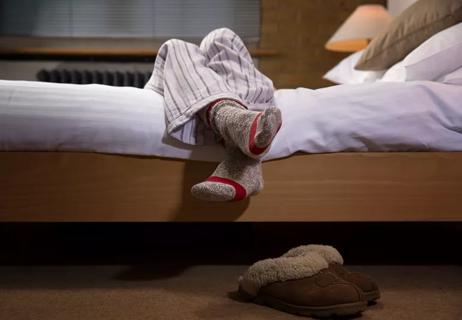These heat waves can actually start in perimenopause, which can begin up to a decade earlier

Cue up Johnny Cash’s “Ring of Fire” because once you’ve started experiencing hot flashes, that’s exactly what it feels like you’ve walked (err, fallen) into.
Advertisement
Cleveland Clinic is a non-profit academic medical center. Advertising on our site helps support our mission. We do not endorse non-Cleveland Clinic products or services. Policy
When you think of hot flashes, you may immediately think of menopause, and it’s true that they’re one of the most common symptoms associated with this time of life. But hot flashes can actually begin long before you’ve entered menopause — when you’re in the years leading up to it, known as perimenopause.
Menopause specialist Pelin Batur, MD, explains what it means when you start having hot flashes and night sweats, known as vasomotor symptoms, and what kind of treatments are available.
You’re in menopause once you have gone a full 12 months without a menstrual period (assuming there’s no other medication or medical condition that would cause you to skip periods).
In the United States, the average age for entering menopause is 51.4 years, with a typical range of 45 to 55. But perimenopause can start much sooner.
“The symptoms can actually start a decade before menopause,” Dr. Batur says. But on average, perimenopause starts about four years before your period stops. This is when menopause-like symptoms — including hot flashes — make their grand debut.
Not everyone who goes through menopause will experience vasomotor symptoms like hot flashes and night sweats, but an estimated 75% do. And the hormone fluctuations associated with menopause can be so pronounced that even if you’re having regular menstrual cycles, you may still have hot flashes.
Advertisement
“Hot flashes are the sudden sensation of heat, and they may or may not be associated with flushing and sweating,” Dr. Batur says. When you’re having a hot flash, it can feel like your body is on fire from the inside out, like you’re radiating heat through your skin.
You can even have hot flashes in your sleep.
“Night sweats can be very disruptive to the sleep cycle,” she adds. “Many people find that they can’t get through the night as well as they could before.”
Hot flashes are usually related to menopause, but not always. In some cases, they can be caused by thyroid disease or cancer treatments, and they can also be a side effect of certain medications. This is another reason why it’s important to talk to your doctor about hot flashes when they begin.
If your hot flashes are negatively impacting your quality of life, it’s time to see a healthcare provider. Here are three treatments they might recommend, depending on your other health conditions and concerns.
The U.S. Food and Drug Administration (FDA) has approved two prescription medications specifically to treat vasomotor symptoms. Both are nonhormonal options.
If you’re having menopause symptoms that extend beyond vasomotor symptoms, your healthcare provider may recommend hormone therapy.
“It’s the most effective treatment that can even out the hormonal ups and downs that are common during perimenopause,” Dr. Batur says.
For most people, hormone therapy is a safe way to deal with the uncomfortable side effects of perimenopause. But Dr. Batur says you may be limited in the types of hormones you can take if you have a history of:
If you can’t (or don’t want to) go on hormone therapy, other medications may help. A variety of medications is FDA-approved for other reasons but have been found to help with hot flashes, too.
“Some antidepressants have been shown to be very beneficial and are our go-to’s for women who are, for example, breast cancer survivors,” Dr. Batur notes. “These are women who sometimes have the worst symptoms but who can’t use hormonal options.”
Other options include an anti-seizure medication called gabapentin and a bladder leakage medication called oxybutynin.
Cognitive behavioral therapy (CBT), a type of talk therapy, may help.
“In well-designed studies, cognitive behavioral therapies — where you focus on your thoughts about hot flashes — have actually been shown to be very helpful,” Dr. Batur says.
Advertisement
Some people also say they find relief from hypnosis and acupuncture, though Dr. Batur says several studies suggest that acupuncture may not treat hot flashes any more than a placebo. Still, if you want to try them, it’s safe to do so.
“It’s just a time and cost investment,” she cautions.
Many people turn to herbs and supplements to fight hot flashes, but research has so far found little evidence that they’re effective.
“Studies show that most of them don’t show much benefit over placebos,” Dr. Batur cautions. “And remember: Just because you get them at the health food store doesn’t necessarily mean they’re safe.”
Hot flashes can be a part of your life for months or years.
“Some people stop having hot flashes about a year after their periods stop,” Dr. Batur says, “but it’s more common for them to stop seven to 12 years after menopause.” In about 9% of women, hot flashes continue indefinitely into their older years.
But no matter how long you have them, one thing remains true: If hot flashes are having a negative impact on your quality of life, it’s time to seek treatment. You don’t have to put up with the internal inferno.
Advertisement
Learn more about our editorial process.
Advertisement

Estrogen loss contributes to bone loss, which significantly raises your risk of osteopenia and osteoporosis

Making certain changes to your diet, sleep habits and even your wardrobe may help lessen the impact of menopause symptoms

A women’s health specialist explains those cold flashes that come on quickly

Changing hormone levels can bring issues like brittle nails, indigestion, dry skin and new allergies (to name a few!)

The choices you make at mealtime could reduce hot flashes or make them worse

If you’ve noticed changes in your mood and mental health while going through menopause, you’re not alone

Missed periods, heavy periods, painful sex and frequent hot flashes are just a few symptoms worth discussing with your provider

At-home tests measure FSH levels in urine, but they can’t actually diagnose menopause

Wearing a scarf, adjusting your outdoor activities and following your asthma treatment plan can help limit breathing problems

Your diet in the weeks, days and hours ahead of your race can power you to the finish line

When someone guilt trips you, they’re using emotionally manipulative behavior to try to get you to act a certain way